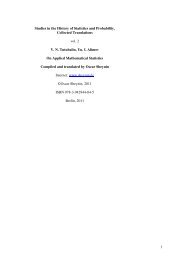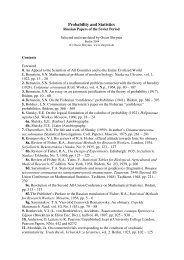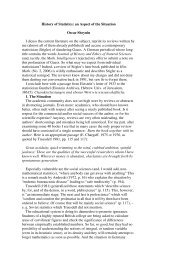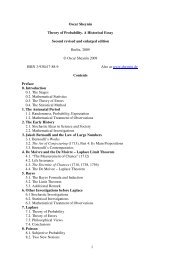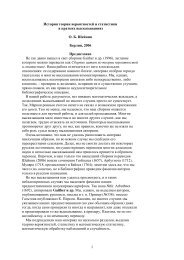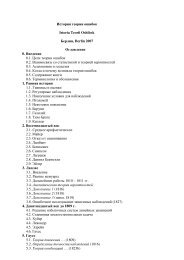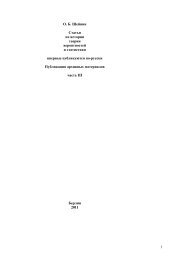will be sufficient, although not necessary, for normal stability. This condition was the basisof Chebyshev’s <strong>and</strong> Markov’s classical theorems.A remark made in 1918 by Bernstein [2] may be considered as a point of departure for thework of <strong>Soviet</strong> mathematicians. He noted that the equality2( ζn− Cn)limE21+( ζ − C )nn= 0 as n (1.1.4)can serve as a necessary <strong>and</strong> sufficient condition of stability for given constants C n . In 1925,Slutsky [5] provided similar but more developed ideas.If the sequence of n is stable, their medians m n can always be chosen as the constants C n .Therefore, owing to Bernstein’s finding, the necessary <strong>and</strong> sufficient condition for stability ofthe sequence of n can be written down as2( ζn− mζn)limE21+( ζ − mζ)nn= 0 as n (1.1.5).It is easy to apply the classical condition (1.1.3) to sums of independent terms n = 1 (n) + 2 (n) + … + n (n) (1.1.6)having finite variances var k (n) = b k (n) ; indeed, the variances of the sums n are the sums of thevariances of the appropriate terms:B n = b 1 (n) + b 2 (n) + … + b n (n) .Unlike the variances B n , the expectations included in conditions (1.1.4) <strong>and</strong> (1.1.5) cannotbe expressed in any easy manner through magnitudes describing the separate terms k (n) . In1928 Kolmogorov [2; 5] discovered a necessary <strong>and</strong> sufficient condition of stability for sumsof independent terms which was easily expressed through the properties of the separate terms.It can be written down as (Gnedenko[24])nlimk = 1( n)( n)2( ξk− mξk)E( n)( n)21+( ξk− mξk)= 0 as n . (1.1.7)A necessary <strong>and</strong> sufficient condition of normal stability for the sums of independent termsis somewhat more complicated (Gnedenko [24]), but, once (1.1.7) is established, itsderivation does not present any great difficulties. Of special interest is the case k (n) = k /n, n = ( 1 + 2 + … + n )/n,where 1 , 2 , …, n … is a sequence of identically distributed independent variables. Here,the necessary <strong>and</strong> sufficient condition of stability becomes extremely simple:lim nP(|| > n) = 0 as n . (1.1.8)This condition {the authors have not specified } is satisfied if such variables k have finiteexpectations, <strong>and</strong> the stability is here certainly normal. This fact constitutes the essence of
Khinchin’s theorem [17]: The arithmetic means n of independent <strong>and</strong> identically distributedvariables k having finite expectations are always normally stable.The results listed above elucidate sufficiently fully <strong>and</strong> definitively the conditions for theapplicability of the law of large numbers to sums of independent variables. The authors citedabove had made use of rather simple mathematical tools which differ, however, in essencefrom the classical method of moments. This is unavoidable. Khinchin [5] showed that, evenif the terms have finite moments of all the orders, there exists no necessary <strong>and</strong> sufficientcondition of stability expressed through them. However, if the problem concerns not theapplicability of the law of large numbers on principle, but rather a sufficiently preciseestimation of the probabilities P(| n – A n | > ), then the transition to higher moments is quitenatural. The main findings in this direction belong to Bernstein [41, pt. 3, chapter 2].1.2. Attraction to the Gauss Law. Keeping to the notation of §1.1, we shall say that asequence of r<strong>and</strong>om variables n is attracted to the Gauss law, if, after appropriately choosingthe constants C n <strong>and</strong> H n > 0, as n ,lim P([( n – C n )/H n ] < t) = (1/t2 π ) −∞exp(– t 2 /2)dt (1.2.1)for any real t. According to the main classical case, the variables n have finite expectationsA n <strong>and</strong> variances B n , <strong>and</strong> (1.2.1) takes place for C n = A n <strong>and</strong> H n = Bn. We shall say herethat the variables are normally attracted to the Gauss law.The derivation of extremely general sufficient conditions for the normal attraction of thesums (1.1.6) of an increasing number of independent terms to the Gauss law is an immortalmerit of Chebyshev, Markov <strong>and</strong> Liapunov. Their investigations were developed byBernstein [13; 40]. With respect to the problem now concerning us, he offered conditionsessentially equivalent to those which later occurred to be, in a sense explicated below,necessary <strong>and</strong> sufficient.The search for unrestricted necessary conditions for attraction to the Gauss law canapparently only lead to barely interesting results formulated in a rather difficult way. This isbecause the very idea of limiting laws for sums of an increasing number of terms is onlynatural when at the same time the separate influence of each of these terms decreases. Thisdem<strong>and</strong> can be precisely expressed by stating that, in addition to (1.2.1)lim[sup P(| k (n) – m k (n) | > H n )] = 0 as n (1.2.2)kshould be satisfied for any > 0. This is the so-called dem<strong>and</strong> of limiting negligibility of theseparate terms. Note that, if the laws of their distributions are identical for a given sum, it isan inevitable conclusion from relation (1.2.1). The ascertaining of the necessary <strong>and</strong>sufficient conditions for the attraction of sums of independent terms to the Gauss law underthe additional requirement (1.2.2) was the result of the investigations made by Khinchin,Lévy <strong>and</strong> Feller; see their reviews by Khinchin [42] <strong>and</strong> Gnedenko [24].We adduce theformulation of one of Khinchin’s theorems that reveals the essence of the matter with anespecial transparency: If condition (1.2.2) is fulfilled, <strong>and</strong>, as n ,lim P([( n – C n )/H n ] < t) = F(t)where F(t) is a non-singular 2 distribution function, then the validity of the condition
- Page 4 and 5: [3] I bear in mind the well-known p
- Page 6 and 7: successes of physical statistics. B
- Page 8 and 9: classes of independent facts whose
- Page 10 and 11: distribution is a corollary of the
- Page 12 and 13: examine in the first place the curv
- Page 14 and 15: 12. According to Bortkiewicz’ ter
- Page 16 and 17: generality, the similarities taking
- Page 18 and 19: one on another, as well as the corr
- Page 20 and 21: is inapplicable because the right s
- Page 22 and 23: Instead, Slutsky introduced new not
- Page 24 and 25: abandoned in August 1936, but it is
- Page 26 and 27: last decades, mathematicians more o
- Page 28 and 29: charged with making the leading ple
- Page 30 and 31: motion and a number of others) are
- Page 32 and 33: phenomena. It is self-evident that
- Page 34 and 35: Such new demands were formulated in
- Page 36 and 37: The addition of independent random
- Page 38 and 39: automatic lathes, etc. Here, the ma
- Page 40 and 41: 11. Kolmogorov, A.N. Grundbegriffe
- Page 42 and 43: period 1 and remained, until the ap
- Page 44 and 45: of the analytical tool rather than
- Page 46 and 47: with probability approaching unity,
- Page 48 and 49: logic. The ensuing vagueness in his
- Page 50 and 51: 2. Gnedenko, B.V. (1949), On Lobach
- Page 54 and 55: nlimk = 1P(| k (n) - m k (n) | > H
- Page 56 and 57: favorite classical issue as the gam
- Page 58 and 59: and some quite definite (not depend
- Page 60 and 61: influenced by a construction that a
- Page 62 and 63: P ij (1) = p ij (1) , P ij (t) =kP
- Page 64 and 65: 4.2d. Bebutov [1; 2] as well as Kry
- Page 66 and 67: are yet no limit theorems correspon
- Page 68 and 69: described, from the viewpoint that
- Page 70 and 71: conditional variance and determined
- Page 72 and 73: Romanovsky [45] and Kolmogorov [46]
- Page 74 and 75: Let S be the general population wit
- Page 76 and 77: Part 1. Russian/Soviet AuthorsAmbar
- Page 78 and 79: 2. On necessary and sufficient cond
- Page 80 and 81: Gnedenko, B.V., Groshev, A.V. 1. On
- Page 82 and 83: 52. ( (Mathematical Principl
- Page 84 and 85: Kozuliaev, P.A. 1. Sur la répartit
- Page 86 and 87: Obukhov, A.M. 1. Normal correlation
- Page 88 and 89: 30. Généralisations d’un théor
- Page 90 and 91: 22. Alcune applicazioni dei coeffic
- Page 92 and 93: 10. A.N. Kolmogorov. The Theory of
- Page 94 and 95: Kuznetsov, Stratonovich & Tikhonov
- Page 96 and 97: In the homogeneous case H s t = H t
- Page 98 and 99: to such a generalization. He only s
- Page 100 and 101: In the particular case of a charact
- Page 102 and 103:
as it is usual for the modern theor
- Page 104 and 105:
1. {The second reference to Pugache
- Page 106 and 107:
Smirnov, Romanovsky and others made
- Page 108 and 109:
determined the precise asymptotic c
- Page 110 and 111:
for finite values of N, M and R 2 .
- Page 112 and 113:
Mikhalevich’s findings by far exc
- Page 114 and 115:
Uch. Zap. = Uchenye ZapiskiUkr = Uk
- Page 116 and 117:
Khinchin, A.Ya. 43. Math. Ann. 101,
- Page 118 and 119:
7. DAN 115, 1957, 49 - 52.Pinsker,
- Page 120 and 121:
Anderson, T.W., Darling, D.A. (1952
- Page 122 and 123:
Statistical problems in radio engin
- Page 124 and 125:
observations for its power with reg
- Page 126 and 127:
securing against mistakes (A.N. Kry
- Page 128 and 129:
of the others, then its distributio
- Page 130 and 131:
In Kiev, in the 1930s, N.M. Krylov



